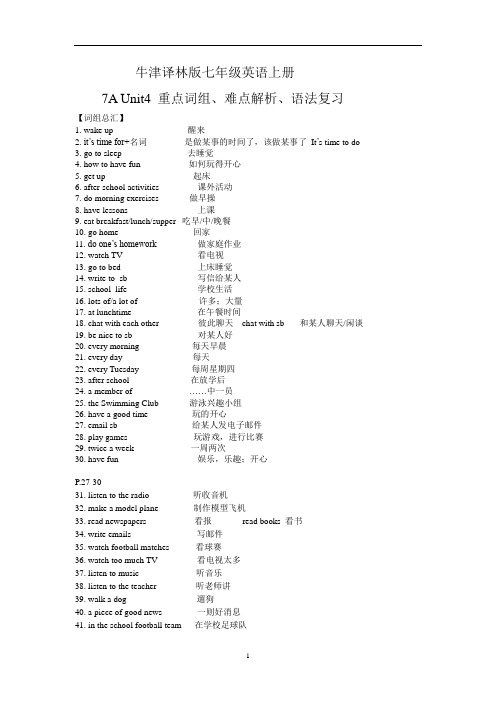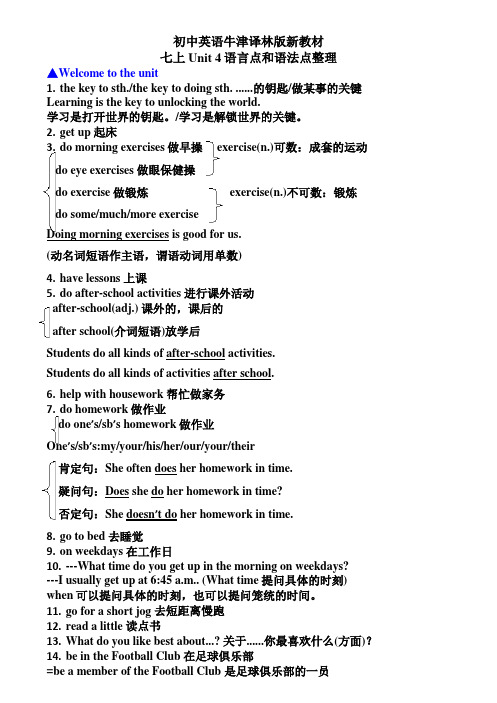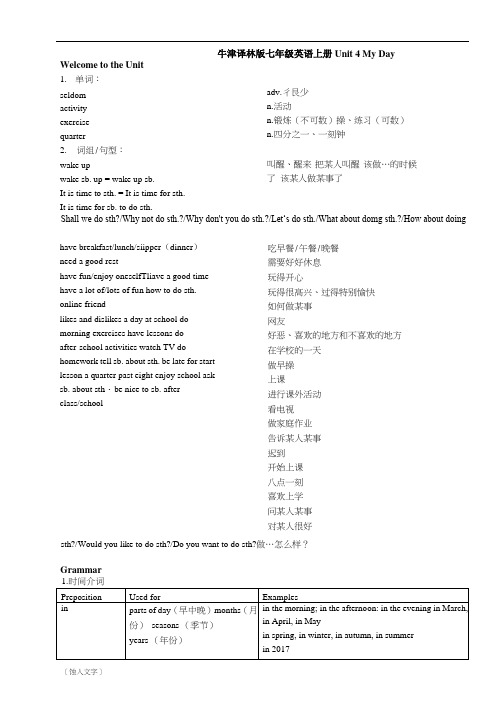牛津译林版英语七上:Unit4课堂笔记
牛津译林版七年级英语上册Unit4知识点讲解

牛津译林版七年级英语上册7A Unit4 重点词组、难点解析、语法复习【词组总汇】1. wake up 醒来2. it’s time for+名词是做某事的时间了,该做某事了It’s time to do3. go to sleep 去睡觉4. how to have fun 如何玩得开心5. get up 起床6. after-school activities 课外活动7. do morning exercises 做早操8. have lessons 上课9. eat breakfast/lunch/supper 吃早/中/晚餐10. go home 回家11. do one’s homework做家庭作业12. watch TV 看电视13. go to bed 上床睡觉14. write to sb 写信给某人15. school life 学校生活16. lots of/a lot of 许多;大量17. at lunchtime 在午餐时间18. chat with each other 彼此聊天chat with sb 和某人聊天/闲谈19. be nice to sb 对某人好20. every morning 每天早晨21. every day 每天22. every Tuesday 每周星期四23. after school 在放学后24. a member of ……中一员25. the Swimming Club 游泳兴趣小组26. have a good time 玩的开心27. email sb 给某人发电子邮件28. play games 玩游戏,进行比赛29. twice a week 一周两次30. have fun 娱乐,乐趣;开心P.27-3031. listen to the radio 听收音机32. make a model plane 制作模型飞机33. read newspapers 看报read books 看书34. write emails 写邮件35. watch football matches 看球赛36. watch too much TV 看电视太多37. listen to music 听音乐38. listen to the teacher 听老师讲39. walk a dog 遛狗40. a piece of good news 一则好消息41. in the school football team 在学校足球队42. all the time 一直43. know (a lot) about…对……了解(很多)44. read comic books 看连环漫画书45. on the volleyball court 在排球场46. from...to…从……到……47. meet up with sb. 约见某人48. do their homework 做他们的作业49. under a big tree 在大树下50. go to one’s dancing lesson 去上舞蹈课51. have (no) time to do sth. 有(没有)时间做某事52. have a lot of new friends 有许多新朋友53. teach us English 教我们英语54. talk about…谈论关于……55. at home 在家56. say hello to…向……问好P.31-3757. the Class 1,Grade 7 students 七年级一班学生58. go on a trip 旅行,旅游have one’s trip59. look at the posters 看海报60. more than 多于;超过61. twice a week 一星期两次62. the China Space Museum 中国航空博物馆63. the China Science and Technology Museum 中国科技博物馆64. next Monday 下周一65. each student 每个学生66. thank you for doing sth 为做某事而谢谢你67. organize the class trip 组织班级旅游68. I would like to+动词原形愿意干某事;想要干某事69. the price for………的价格70. be open/be closed 开着、关着71. look forward to…期盼;盼望72. enjoy…very much 非常喜爱……73.need to do sth 需要做……74. borrow a pen 借一支钢笔75. be busy doing 忙于做某事76. be good for 有益于77. help sb do sth 帮助某人做某事78. get ready for 准备……79. learn more about 更多了解……80. the answer to ………的答案81. the Computer Club 电脑兴趣小组【难点解析】1. Is it time for breakfast? 是吃早餐的时间了吗?it’s time for+名词,“是做某事的时间了,该做某事了”=it’s time to+动词原形.例如:It’s time for class.是上课的时间了。
牛津译林版七年级英语上册Unit4知识点总结与练习

4.You must do your_______(家庭作业)in the evening.
5.Sandy and Amy are my_______(最好的)friends.
6.Simon likes_______(聊天)with his friends after lunch.
21.practice playing the piano
22.on Wednesday afternoon
23.have fun/ enjoy oneself/ have a good time
24.Our school day/ School/ Our school starts at 8 o’clock..
Integrated Skills
1.问题的答案
2.7班和9班间的一场排球赛
3.在本周六晚上
4.祝我们队好运。
5.我希望成为一名歌手。
6.我希望她能和我一起去野餐。
7.他拜访博物馆一周一次。
8.做早操帮助我们为一天做好准备。
9.了解很多关于这个世界
10.有太多回家作业
11.有太多历史练习题
12.对他们有益/有害
_________________________________________________________________
【课堂巩固】
根据句意及汉语提示完成单词
1.I like climb the_______(小山).What about you?
2.They_______(通常)go shopping at the weekend.
牛津译林版七年级上册(2024)Unit 4 School day 语言点和语法点整理

初中英语牛津译林版新教材七上Unit 4语言点和语法点整理▲Welcome to the unit1.the key to sth./the key to doing sth. ......的钥匙/做某事的关键Learning is the key to unlocking the world.学习是打开世界的钥匙。
/学习是解锁世界的关键。
2.get up 起床3.do morning exercises做早操 exercise(n.)可数:成套的运动 do eye exercises 做眼保健操do exercise 做锻炼 exercise(n.)不可数:锻炼do some/much/more exerciseDoing morning exercises is good for us.(动名词短语作主语,谓语动词用单数)4.have lessons 上课5.do after-school activities 进行课外活动after-school(adj.) 课外的,课后的after school(介词短语)放学后Students do all kinds of after-school activities.Students do all kinds of activities after school.6.help with housework 帮忙做家务7.do homework做作业do one’s/sb’s homework做作业One’s/sb’s:my/your/his/her/our/your/their肯定句:She often does her homework in time.疑问句:Does she do her homework in time?否定句:She doesn’t do her homework in time.8.go to bed 去睡觉9.on weekdays 在工作日10.---What time do you get up in the morning on weekdays?---I usually get up at 6:45 a.m.. (What time提问具体的时刻) when可以提问具体的时刻,也可以提问笼统的时间。
译林牛津初中英语7年级上册第四单元Unit4知识点汇总

【7AU4根底音标学习】/ a:/armartcarstar/ ?:/tallhorseshortwalk/ i:/eatreadmeetsee/ e/breadheadheavyweather/ u:/coolfoodmoonschool/ ?/bookgoodlookwould/ ?:/birdgirlnurseworld/ ?/afterdinnerfatherworker【7AU4重点短语归纳】1.wakeupsb.=wakesb.Up2.it’stimefordoingsth./todosth.3.havefun=haveagoodtime=enjoyone’sself4.needagoodrest5.howtohavefun6.belatefor7.fromMondaytoFriday8.doafterschoolactivities9.beverygoodatsth.10.begin/starttosth.11.benice/good/badtosb.12.chatwitheachother13.practicesth./doingsth.14.allthebest15.wouldliketodosth.=wanttodosth.16.wishsb,/sth.goodluck=goodlucktosb./sth.17.helpsb.withsth.=helpsb.dosth.18.gorollerskating 叫醒某人是该的时间了玩得快乐,过得愉快需要一个好的休息怎样玩乐迟到从周一到周五做课后活动非常擅长某事开始做某事对某人好/坏互相聊天练习做某事一切顺利,万事如意想要做某事祝某人/某事好运帮助某人做某事溜旱冰19.betweenSunshineMiddleSchoolandMoonlightMiddleSchool 在阳光中学和月光中学之间20.SunshineSportsCentre21.at/onweekends=at/ontheweekends22.first=atfirst=firstatall23.visitthemuseums24.twiceamonth25.goonapicnic=haveapicnic26.onceaweek27.goonaclass/autumntrip28.begood/badforsb.29.getreadyforsth.30.learnalotaboutsth.=knowmuchaboutsth.阳光体育中心在周末首先参观博物馆一个月两次去野营一个星期一次去班级/秋天之旅对某人有利/害为某事做好准备知道很多有关某事【7AU4重点语法点拨】时间介词(at,in,on) 的用法at1〕时间的一点、时刻等。
牛津译林版七年级英语上册7A Unit4 知识点与语法点讲解与分析

牛津译林版七年级英语上册7Aunit4知识点与语法点讲解与分析知识点:1 wake up 当接代词作宾语时,代词放在中间,接名词可放后面或中间,类似词组pick up/try on/put on/take of/turn on/turn dow n2 It is time for +sth /doing sth ---- 是----- 的时候了” = It is time to do sth.【拓展】It ' s time for sb to do到某人做某事的时间了eg: It ' s time for you to do your homework— It ' s time for doing your homework.3 sleep/go to sleep/go to bed/ 区另U4 how to have fun是特殊疑问词+动词不定式"构成的不定式短语;have fun=have agood/great/wo nderful time=enjoy on eself 过得愉快"” fun 为不可数名词。
5 watch/look/see/read 区另U6 write to sb给某人写信”7 be nice to sb对某人友好”类似结构:be frie ndly to sb 对某人友好be polite to sb 对某人礼貌8 first adj/adv &n 第一,首先,最初Eg Sun day is the first day of the week.I get back home after school and I do my homework first.【注】first为序数词,前面应加定冠词the。
但序数词作定语且前面有形容词性物主代词等修饰时,不带the。
This is our first less on.固定搭配:at first起先first of all 首先【拓展】firstly adv首先,第一9. once adv 一次;一度Once用作副词,表示一次,具有数量之意,与某一特定范围连用表示频率。
牛津译林版七年级英语上册7A Unit4课本重点知识

[蚀入文字]牛津译林版七年级英语上册Unit 4 My DayShall we do sth?/Why not do sth.?/Why don't you do sth.?/Let‘s do sth./What about domg sth.?/How about doing sth?/Would you like to do sth?/Do you want to do sth?做…怎么样?GrammarWelcome to the Unit1. 单词: seldom activity exercise quarter2. 词组/句型: wake upwake sb. up = wake up sb. It is time to sth. = It is time for sth.It is time for sb. to do sth.adv.彳艮少 n.活动n.锻炼(不可数)操、练习(可数) n.四分之一、一刻钟叫醒、醒来 把某人叫醒 该做…的时候了 该某人做某事了have breakfast/lunch/siipper (dinner ) need a good resthave fun/enjoy oneselfTliave a good time have a lot of/lots of fun how to do sth. online friendlikes and dislikes a day at school do morning exercises have lessons do after-school activities watch TV do homework tell sb. about sth. be late for start lesson a quarter past eight enjoy school ask sb. about sth ・ be nice to sb. after class/school吃早餐/午餐/晚餐 需要好好休息 玩得开心玩得很髙兴、过得特别愉快 如何做某事 网友好恶、喜欢的地方和不喜欢的地方 在学校的一天 做早操 上课 进行课外活动 看电视 做家庭作业 告诉某人某事 迟到 开始上课 八点一刻 喜欢上学 问某人某事 对某人很好下课后/放学后never: 0%, rarely:5%, seldom: 10%; occasionally: 30%, sometimes: 50%; often: 70%; frequently: 90%, usually: 90%; always: 100% -------- 回答how often (多久一次)3.单词:never adv.从不seldom adv.很少sometimes adv.有时often adv.经常usually adv.通常always adv.总是tennis n.网球roller skating 滑旱冰4.词组/句型:go swimming 游泳tell sb. about sth. 告诉某人某事on Saturday afternoon 周六下午write back to sb. 给某人写回信help sb (to) do sth./help sb. with sth. 帮助某人做某事help each other 互相帮助thanks for (doing) sth./thank you for (doing)sth. 谢谢做了某事would like to do sth./want to do s(h. 想要做某事complete sth. with sth. 用…完成…play football with sb. 与某人踢足球practise doing sth. 练习做某事play tennis 打网球go roller skating 滑旱冰a member of …的成员,的一员have time to do sth. 有时间做某事Integrated skills1.单词:volleyball between below museumn.排球prep.在…之间prep.在…下而n.博物馆[蚀入文字][蚀入文字]2.词组/句型talk with sb. about sth. volleyball match make notes welcome to the match watch the game wish sb. good luck chat with sb. about sth. at weekends visit the museum once/twice/three times a week What about you?go on picnics/go on a picnic跟某人谈论某事 排球比赛 做笔记 欢迎参加比赛 观看比赛 祝某人好运 与某人聊天 在周末 去博物馆 一周一次/两次/三次 你呢? 去野餐Study Skills 元音。
Unit4知识点梳理2023-2024学年牛津译林版英语七年级上册
第三讲7AUnit4 Language Point 复习1.How often和How many times的区别①How often do you watch TV?I watch TV every day.How many times do you watch TV a week?I watch TV seven times a week.2.How often和How many times的区别②How often do you watch TV?How many times do you watch TV a week?How often= How many times +时间范围1. will he leave here?He will leave here in a month.A. How oftenB. How longC. How soonD. How many times2. does he watch TV.Once a week.A. How oftenB. How manyC. How longD. How soon3. I don't know he will get here.A. how longB. how soonC. how oftenD. how4. does he take this medicine?Twice a day.A. How soonB. How longC. How muchD. How often5. can you finish this work?A. How oftenB. How manyC. How longD. How soon6. have you been at this factory?I have been here since 1993A. how longB. how soonC. how oftenD. how many7. does your sister write to your parents?A. How soonB. How longC. How muchD. How often8. does it take you to finish you homework every day?.A. How oftenB. How manyC. How longD. How soon9. will he stay here?A. how longB. how soonC. how oftenD. how many10. did the meeting last?About half an hour.A. How soonB. How longC. How farD. How often3.Reading is fun.阅读是有趣的事。
Unit4知识点梳理牛津译林版七年级英语上册
牛津译林版七上Unit 4 知识点梳理1.Wake up, Eddie. 醒醒,埃迪。
wake up:“醒来”。
“唤醒某人”:如果所接宾语是人称代词,只能放在wake和up中间;如果所接宾语是名词,放在up、前后均可。
awake:adj.“醒着的”。
2.Is it time fro breakfast? 到吃早饭的时间了吗?It’s time for sth.“是做某事的时间了。
”= It’s time to do sth.It’s time for sb. to do sth.“该是某人做某事的时候了。
”3.Shall we go walking in the hills? 我们去山上散步好吗?Shall we...? “我们……好吗?”(表示征求或提出建议。
)4.I seldom go out. 我很少外出。
seldom:adv.“很少,不常,难得”(位于行为动词之前,助动词、情态动词或连系动词之后),表示否定。
go out:“出去”。
5....and then I have lunch. ……然后吃午饭。
have lunch:“吃午饭”。
→have breakfast “吃早饭”;have dinner/supper “吃晚饭”。
have:v.“吃;喝”;“有”;“举办,举行”;“度过,经历”。
三单:has。
6.After lunch, I always need a good rest. 午饭后,我总是需要好好休息。
need:v.“需要”。
need sth. “需要某物”;need to do sth. “需要做某事”;need sb. to do sth. “需要某人做某事”;sth. need(s) doing “需要”。
情态动词,“需要”,后接动词原形,常用于否定句和疑问句。
rest:n.“休息,歇息”(= break)。
have a (good) rest “(好好)休息”。
作动词,“休息”。
牛津译林版七年级英语上册Unit4重点知识点汇总
牛津译林版七年级英语上册Unit4重点知识点汇总【重点单词】1.wake [weɪk] vi.&vt. 醒,醒来;唤醒2.hill [hɪl] n. 小山3.seldom ['seldəm] adv. 很少,不常4.out [aʊt] adv. 出来,向外,外出5.need [niːd] vt. 需要6.rest [rest] n. 休息,歇息7.just [dʒʌst] adv. 只是8.activity [æk'tɪvɪti] n. 活动9.homework ['həʊmwɜːk] n. 家庭作业ually ['juːʒʊəli] adv. 通常,经常11.never ['nevə] adv. 从不,绝不12.start [stɑːt] vt.&vi. 开始,着手13.quarter ['kwɔːtə] n. 一刻钟14.past [pɑːst] prep. 晚于15.first [fɜːst] adv. 首先16.chat [tʃæt] vi. 聊天,闲聊17.each [iːtʃ] pron. 每人,每个,每件18.other ['ʌðə] pron. 另外,其他19.practise ['præktɪs] vi.&vt. <英>练习;训练20.wish [wɪʃ] n. 希望,祝愿21.life [laɪf] n. 生活;生命22.luck [lʌk] n. 好运,幸运23.museum [mjuː'zɪəm] n. 博物馆24.twice [twaɪs] adv. 两次25.picnic ['pɪknɪk] n. 野餐26.once [wʌns] adv. 一次27.dislike [dɪs'laɪk] n. 不喜爱,厌恶28.reason ['riːz(ə)n] n. 原因,理由29.ready ['redi] adj. 准备好,准备完毕30.learn [lɜːn] vt.&vi. 学,学习,学会31.world [wɜːld] n. 世界【重点短语】1.wake up 醒来2.between...and... 在……和……之间3. go walking in the hills 去山上散步4. need to do sth. 需要做某事5. From Monday to Friday 从周一到周五6. do morning exercises 做早操7. do eye exercises 做眼保健操8. have lessons 上课9. start/begin lessons 开始上课10. do after-school activities 做课外活动11. be never late for work/school 上班/上学从不迟到12. chat with sb. 和某人聊天13. help each other 互相帮助14. play in the playground 在操场上玩15. be in the school volleyball team是校排球队成员16. practise doing sth. 练习做某事17. have a good time doing sth. 做某事很愉快18. all the best 一切顺利,万事如意19. go roller skating 去溜旱冰20. visit a museum 参观博物馆21. get ready for sth. 为某事做好准备22. learn a lot about sth 关于某事了解很多23. too much homework 太多作业24. much too cold/hot 太冷/热【重点句型】1.Some dogs just don’t know how to have fun.有些狗就是不知道怎样玩乐。
牛津译林版英语七年级英语上册unit4重点知识汇总
牛津译林版英语七年级英语上册unit 4 要点知识整理汇总一.短语1. wake up 醒来2. wake sb. up叫醒某人3. Its time for sth.It ’ s time (for sb.) to do sth是.(某人)干某事的时候了4. go walking in the hills 去山上漫步5. seldom go out 极少出门6. need a good rest 需要好好歇息=need to have a good rest7. need to do sth. 需要做某事8. write to her online friend 写信给她的网友9. do morning exercises 做晨操10. do eye exercises 做眼保健操11. do some exercise 锻炼12. have lessons 上课13. start (begin) lessons 开始上课14. do after-school activities 做课外活动15.be never late for work / school上班 / 上学从不迟到16.one of.. .之一。
后接可数名词复数17. be all nice to sb. 都对某人很好18. chat with sb. 和某人聊天19. chat with each other 相互聊天20. help each other 相互帮助play in the playground 在操场上玩be in the school volleyball team是校排球队成员=be a member of the school volleyball team23. practise after school放学后训练practise doing sth.练习/ 训练做某事24. on Wednesday afternoon在周三下午have a good time doing sth=have fun doing sth.做某事过得快乐26. in spring / summer / autumn / winter27. at 6 years old 在六岁 =at 6=at the age of 628. all the best 全部顺利,万事如意29.have much time to do sth. 有好多时间做某事30.have no time to do sth. 没有时间做某事31. go to her dancing lessons 去上舞蹈课32. dance for half an hour 跳舞半小时33. go roller skating 去溜旱冰34. go walking 去漫步35.between...and... 在...和...之间36. visit a museum 观光博物馆37.go on picnics with my family twice a month 一个月两次和我家人去野餐38. at noon 在正午39. at night 在夜里40. at work 在工作42.be bad for sb. 有 ..害43. help sb. get ready for sth 帮助某人为 ...做好准备44.get ready to do sth 准备好做某事 =be ready to do sth.45. learn a lot about sth 对于某事认识好多46. learn more about sth. 对于某事认识更多47. too much homework 太多作业48. too many lessons 太多课49. much too cold (hot)太冷(热)二.句子:1.Some dogs just don ’ t know how to have有些fun狗.就是不知道如何玩乐。
- 1、下载文档前请自行甄别文档内容的完整性,平台不提供额外的编辑、内容补充、找答案等附加服务。
- 2、"仅部分预览"的文档,不可在线预览部分如存在完整性等问题,可反馈申请退款(可完整预览的文档不适用该条件!)。
- 3、如文档侵犯您的权益,请联系客服反馈,我们会尽快为您处理(人工客服工作时间:9:00-18:30)。
初中英语学习材料madeofjingetieji一.课文重点Comic strip1.It’s lunchtime. 是吃午饭的时间了.= It’s time for lunch. = It’s time to have lunch.2.Let’s have a h amburger. 让我们吃一个汉包堡.概括: Let’s do sth 让我们做某事(Let’s后用动原)3.be always hungry总是饿(always等频度副词放在情动\Be动\助动之后,行为动词之前)4.need a lot of energy 需要许多能量否定: don’t need a lot of energy (此处的need 为行为动词)5. walk to my bowl many times a day 每天往我的碗走好多次画线提问用how often (多长时间一次),类似的还有:once a week (一周一次),twice a week (一周两次), three times a month (一月三次)6. a healthy person 一个健康的人区别:healthy 健康的(形) e.g. be healthy / keep healthy 保持健康a healthy diet 一个健康的日常饮食health 健康(名 ) e.g. be good for your health 对你的健康有好/益处be bad for your health 对你的健康有害Welcome to the unit1.What is your favourite food?你最喜爱的事物是什么?= What food do you like best? (favourite = like … best )2.What about …. ? …怎么样?What about doing sth ? 做某事怎么样? (about是介词,后跟动词要加ing)3.like sth / dislike sth /love/ hate sth 喜欢/不喜欢/爱/恨某物Like doing / dislike doing sth /love doing sth /hate doing sth喜欢/不喜欢/爱/恨做某事Reading1.want to be a dancer 想成为一名舞蹈家want to be …想成为…2. I dance for two hours every day.对划线提问用How long (多长时间)3.need lots of energy to dance 需要许多能量去跳舞概括: need sth to do …需用某物去做…扩展: need sb to do sth 需用某人做某事need to do sth 需用做某事4.get tired变得疲劳,变累5. I t’s very easy for me to get tired.对我来说很容易变累。
概括: I t’s easy for sb to do sth . 对某人来说,做某事是容易的。
扩展: I t’s difficult for sb to do sth . 对某人来说,做某事是困难的。
I t’s important fo r sb to do sth . 对某人来说,做某事是重要的。
It’s + adj.+for sb + to do sth 对某人来说,做某事是……的.(It 是假主语)It’s + adj.+ to do sth 做某事是……的.e.g. I t’s important for us to learn English well . 对我们来说,学好英语重要的。
I t’s important to learn English well . 学好英语重要的。
6.need to keep fit 需要保持健康概括:need to do sth 需用做某事否定: don’t need to do sth 不需用做某事,不必做某事7.between meals 在两餐饭之间(between在两者之间,介词)e.g. between us 在我们俩之间between you and me 在你和我之间8.too much sugar 太多的糖概括:too much 太多(后跟不可数名词)扩展: too many 太多(后跟可数名词复数) e.g. too many books 太多的书much too 太.. (后跟形容词或者副词)many too (无此用法)9.give me energy 给我能量= give energy to me10.want to be healthy 想保持健康11.eat an apple for breakfast (表达三餐饭吃什么时用for)12.after class 下课后in class 在课堂上after school 放学后13.like playing computer games 喜欢玩电脑游戏14.chat with my friends on the Internet 在互联网上和我的朋友们聊天15.a top student 一个尖子生16.It’s time for me to change now.现在,是我改变的时候了.概括: It’s time for sb to do sth . 是某人做某事的时候了.e.g. It’s time for me to go to school. 是我上学的时候了.17.I plan to go swimming twice a week. 我计划一周游泳两次概括: plan to do sth 计划做某事扩展:once a week (一周一次), three times a month (一月三次)18.sports activities 体育活动Vocabulary1.live in water 生活在水里Grammar1.don’t have much time to do sth 没有很多时间做某事2.three times a week 一周三次three times a week 划线提问用How often3.all his free time 所有他的空闲时间4.go roller skating 去溜旱冰5.four kilos of meat 四公斤肉6.Do we need to buy some …?(用some )我们需要买些…吗?7.so many things 如此多的东西概括: so much 如此多(后跟不可数名词)扩展:so many 如此多(后跟可数名词复数)8.a bottle of Coke 一瓶可乐9.have some noodles 吃些面条(面条可数)Integrated skills1.less than three times a week 一周不到三次2.three to six times a week 一周三到六次3.more than 超过4.I watch two hours of TV every day .划线提问: How much TV do you watch every day ?I watch TV for two hours every day .划线提问: How long do you watch TV every day ?5.not … at all 根本不,一点也不6.exercise more , watch less TV多锻炼,少看电视7.How do you like your new diet? 你觉得你新的日常饮食怎么样?概括: How do you like …? 你觉得……怎么样?=W hat do you think of…?8.I don’t eat them any more . 我不再吃他们了.not… any more 不再= no more9.like eating sweets 喜欢吃糖果10.eat lots of fruit吃许多水果11.Good luck with sth 祝某事好运Good luck to sb 祝某人好运Main task1.have rice with fish for lunch 午饭吃大米外加鱼肉2.have soup and meat 喝汤和吃肉3.need vitamins to stay healthy 需要维生素来保持健康4.It is important to drink lots of water every day .每天喝许多水是重要的概括: It’s + adj.+ to do sth 做某事是……的.5. There are no calories in water. 水里没有卡路里6.without getting fat 不变胖(without 不,没有介词,后跟动词加ing)用法1. without doing sth 2.without sthe.g. go to school without having breakfast 不吃早饭上学= go to school without breakfast二语法重点1.频度副词。
频度副词表示事情每隔多久发生一次。
never 从不0% seldom 很少20% (否定)sometimes 有时40% often 经常60% usually通常80% always 总是100% a)频度副词通常放在情动\be动\助动之后.行为动词之前。
e.g. Mike is always happy.麦克总是开心。
I always play basketball after school.放学后我总是打篮球。
b)对频度副词提问,用how often2.a 或an 的选择(看发音,不看字母)a用在发音以辅音开头的单词前; an用在发音以元音开头的单词前3.可数名词变为复数形式规则的可数名词变复数方法:a)一般情况加s e.g. a pen→pensb)辅音字母+y结尾的,将y变为i,然后再加es e.g. a story→storiesc) 元音字母+y结尾的,直接加s e.g. a boy→boysd)以s, sh, ch, x等结尾的加es e.g. a box→boxese)以f,fe结尾的将f,fe变为ves e.g. a knife→knivesf)以o结尾的有生命的加es , e.g. a potato→potatoes无生命的加“s” e.g. a radio→radios不规则的可数名词变复数a)单复数同形的: sheep→sheep, fish→fish, Chinese→Chinese, Japanese→Japaneseb)部分字母变化的: man→men woman→women child→childrenmouse →mice foot→feet tooth→teethc)部分单词只有复数: people (人们) trousers (裤子)。
